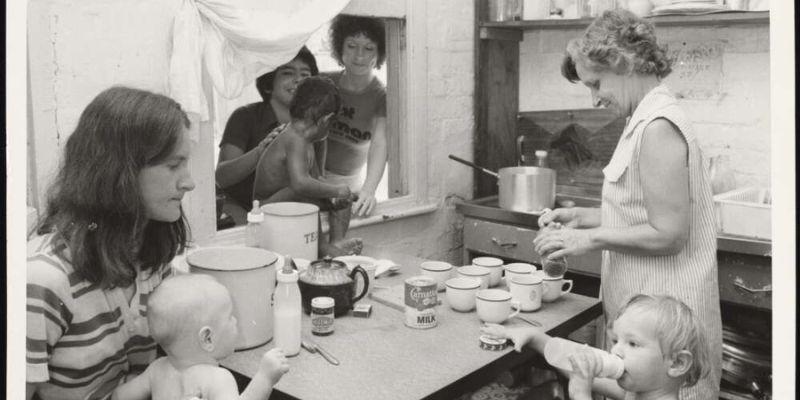The making of a movement
Fifty years ago, a group of women broke into a vacant home to create Australia’s first women’s refuge – changing the future of the women’s movement. UTS’s own Professor Anne Summers AO, one of the leaders, sat down to tell us all about it.

Image: National Library of Australia
It’s 15 March 1974, Autumn has just begun and the air is mild in Sydney's Inner West. A group of 50 or so women have gathered in a Glebe park. They’re carrying brooms, mops, buckets and, inexplicably, balloons. They begin to march through the streets of Glebe, turning onto Westmoreland Street, where they arrive at a vacant home. A plaque on the house reads Elsie.
‘Who’d like to do the honours?’, one woman asks, shortly followed by a loud smash as a window to the home is broken. On a high, they enter the house and immediately change the locks. A woman notices the house next door is vacant. They break that window, too.
Under the laws of the time, these actions gave them squatters' rights. Entering and occupying these homes was a risk, and to pull it off, the timing had to be perfect. Fortunately, for this group of activists, all went according to plan and without realising it at the time, they had just secured Elsie and Minnie, two derelict townhouses that would become Australia’s first women’s refuges.
In Australia, there were no facilities then that offered 24-hour shelter for women and children fleeing violence. There were a few overnight shelters run by St Vincent de Paul and the Salvation Army, but those who sought safety had to leave in the morning. They couldn’t leave their kids or their luggage and had nowhere to go during the day. So, when Professor Summers and the other Elsie founders first considered starting their own refuge – based on the UK’s Chiswick Women’s Aid – they knew that having 24-hour access had to be a defining feature.
None of the founders of Elsie were social workers, or experts in any capacity. They had no money and even less of an idea of how to run a refuge or deal with traumatised people. But what they did have was the knowledge that women were staying in dangerous situations because they had nowhere to go, and the government at the time was taking far too long to do anything about it.

Image: National Library of Australia
They cleaned up the houses as best as they could, built bunk beds and took turns volunteering round the clock. They were unprepared for some of the teething issues, though, such as what to do when women who were struggling with drug and alcohol addiction sought refuge.
While modern refuges tend not to publish their address for safety reasons, it was vital that news of Elsie got out. Not just for the women who needed the service but to increase public awareness of the need for these services. Professor Summers used her media contacts to spread awareness, going on television and radio to speak about the refuge.
It took 3 days for the first woman to come; they didn’t stop after that.
One woman told me that she was doing the dishes when she heard me talking on the radio. And she took off her rubber gloves, wrote down the number and two weeks later she turned up at Elsie.
Looking back, Professor Summers reflects on how they could have approached things better. While many in the community understood the importance of such a resource, those same community members criticised how the Elsie founders went about it. ‘We were considered like the Sydney roustabouts who just went off the deep end ... not doing things the nice way, like everybody else.’ It worked, though – within a few months, there were 6 more refuges throughout Australia.
But for every bit of criticism they received, there was more support. Local businesses provided them with food and Joyce Mayne, the owner of the white goods chain, phoned Professor Summers personally to ask what appliances and wares they needed.
Professor Summers wishes they had been able to offer more dignity to the women, rather than cramming them into shared rooms with bunk beds, but, as she puts it, ‘All we had to offer them was safety’ and that was far better than nothing.
As we approach the 50th anniversary of the historic beginning of Elsie, UTS is hosting a conference to celebrate and reflect on the past, while looking to the future with a recharged commitment. Over 2 days, refuge and shelter workers, advocates and organisations, researchers and public policymakers will be brought together. The stellar lineup of panellists includes Australia’s first Domestic, Family and Sexual Violence Commissioner, Micaela Cronin, former Governor General, Quentin Bryce, the CEO of Muslim Women Australia, Maha Abdo, and more. Also present will be the founders of some of Australia’s first refuges – including the founders of a Marrickville refuge who thought the Elsie women were admirable but irresponsible.
On what it was like to break the rules and make such a momentous move for women, Professor Summers said, ‘It just felt normal. We were just going to do it and we did it. And I don’t think we ever stopped to think that it was brave or daring or stupid or historic.’
UTS proudly hosted the Elsie conference from 15-16 March 2024, celebrating the 50-year anniversary of this historic moment.
Professor Anne Summers AO works in the UTS Business School where her research is dedicated to ending domestic and family violence.
